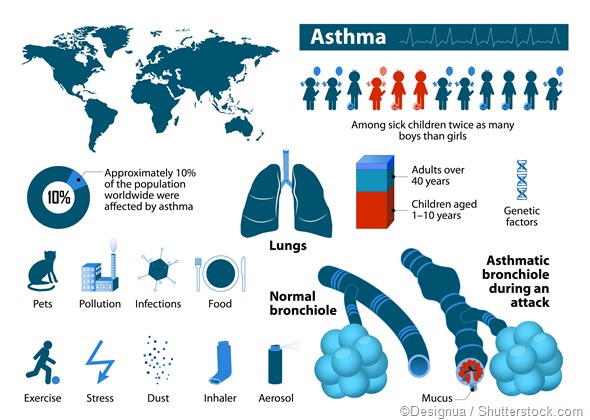The precise cause of asthma isn’t entirely clear. However, there are a number of environmental and inherited factors that are thought to be involved in causing the condition.
Additionally, there are also triggers for asthma that are known to induce or worsen symptoms of asthma in individuals who are known to suffer from the condition. The triggers for asthma are allergens and can differ for each individual with asthma.
Risk factors
Although the exact cause is not known, the following risk factors are associated with an increased likelihood of developing the condition:
- Family history of asthma, eczema, or allergies.
- Personal medical history of bronchiolitis, eczema, or allergies (e.g., hayfever)
- Premature birth, particularly if a ventilator was required to assist breathing following birth
- Low birth rate
- Mother who smoked during pregnancy
- Parents who smoke
- Exposure to second-hand cigarette smoke (particularly for children)
- Exposure to airborne irritant at work
- Hormonal changes
There are some other health conditions that may be linked to asthma, such as eczema and allergies (e.g., hayfever). Individuals with one of these conditions are more likely to be affected by another one and the pathology and cause of the conditions may also be associated.
There is also a genetic link to asthma, as individuals with parents who have asthma are more likely to be affected by the condition. However, genetics does not appear to be the sole cause, as individuals with no family history of asthma are often diagnosed with the condition, and environmental factors also play a role.

Reasons for increasing incidence
The incidence of individuals diagnosed with asthma appears to be on the rise, which brings us to the question why people are more likely to have asthma today and what is causing it.
There are several possible explanations, such as the changes in lifestyle that have occurred in recent decades, particularly in terms of housing, diet, and hygiene standards.
The hygiene hypothesis is a theory based on the stark changes in the hygiene and sanitation standard adopted in modern Western lifestyle.
The high levels of sanitation are proposed to have resulted in a dramatic decline in exposure to organisms and infections in early childhood. This may have an effect on the development of the immune system and result in an increased risk for asthma.
Additionally, the levels of air pollution have risen in many areas in recent times, which may cause increased exposure to irritants and risk of acquiring asthma.
Ask the expert: Is the prevalence of asthma increasing
Triggers
- Triggers for asthma that can worsen the condition include:
- Indoor allergens such as dust mites, mold, and pet dander
- Outdoor allergens such as pollen from grass and trees
- Respiratory infections
- Physical activity
- Cold air
- Sulfites and other food preservatives
- Stress
- Air pollutant and irritants (e.g., smoke or fumes)
- Medications (e.g., beta blockers or non-steroidal anti-inflammatory drugs (NSAIDS))
- Medical conditions (e.g. gastroesophageal reflux disease (GERD)
It is important for people who have been diagnosed with asthma to avoid or reduce exposure to these triggers where possible. This should help to reduce the severity of their symptoms and improve their quality of life.
References
- http://www.mayoclinic.org/diseases-conditions/asthma/basics/causes/con-20026992
- http://www.aafa.org/page/asthma-triggers-causes.aspx
- https://www.asthma.org.uk/advice/understanding-asthma/causes/
- http://www.nhs.uk/Conditions/Asthma/Pages/Causes.aspx
- https://www.nhlbi.nih.gov/
Further Reading
Last Updated: Jan 2, 2023